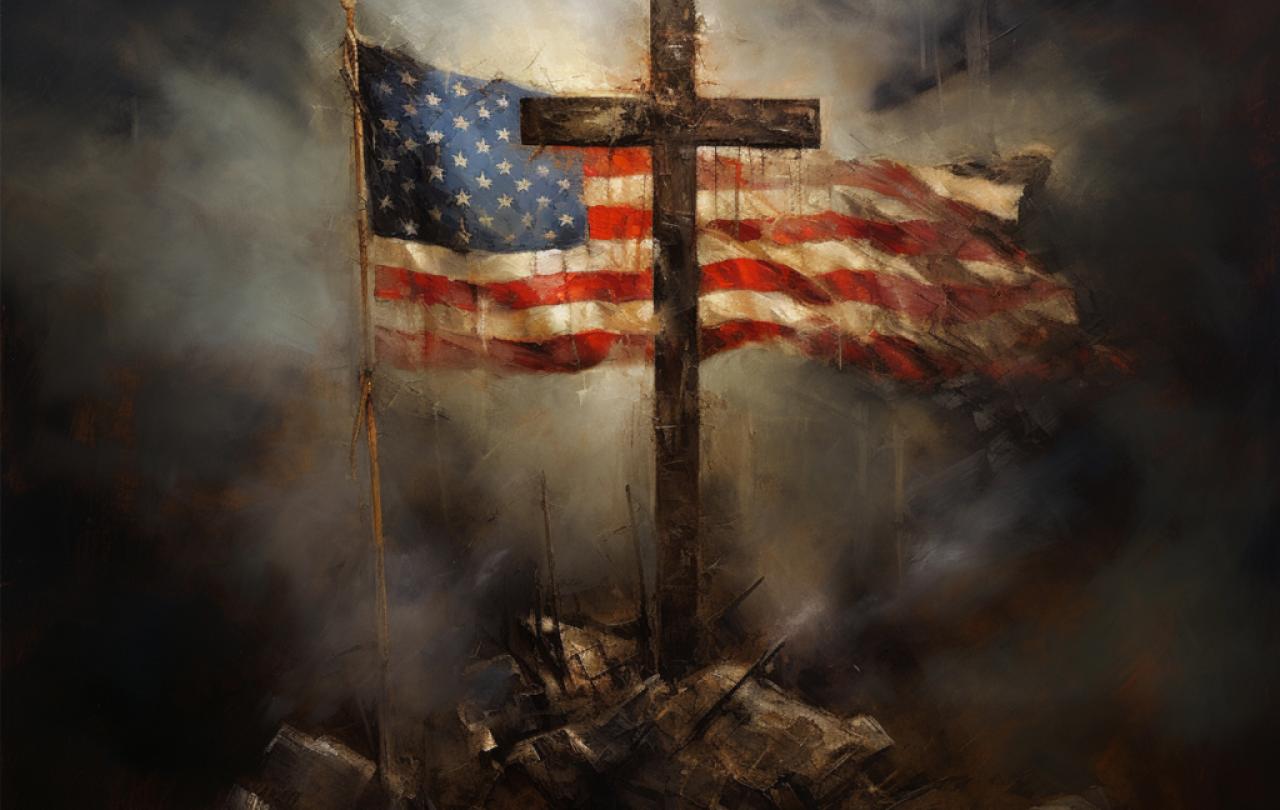The manipulation, indoctrination and unethical way that Evangelicals gripped my generation has spiraled into the current state of American political right—especially the MAGA crowd. Generation X were coming of age in the late 70’s-the early 90’s, just the American Evangelical movement was also weaving its way into national politics and attempting to find a hold in mainstream America. One of the main ways this movement was targeting youth was through music. There was an attempt to create music that copied secular rock and pop music to recruit youth into the church or get Christian kids to avoid the secular music of their peers. Most of these early attempts fell quite flat to capture the production values, songwriting, and just overall talent. A few acts in these infantile days of CCM (Contemporary Christian Music) managed to gain success because they had some chops to go with their blatant Christian message—most however were an obvious subpar attempt.
I remember my first Christian music concert. It was 1983 at Blossom Music Center to see the prog rock band Petra. They had a synth heavy, guitar rock sound that was like bands that was like bands like Kansas or Journey. The album covers were these cool sci-fi depictions of spaceships that seemed to play on the popularity of Star Wars. The music wasn’t my thing though I did think the guitar riffs were cool and Greg X Volz could compete with most frontmen as a vocalist. What was most interesting was the messaging—the lyrics were unapologetically Christian. This band had a at times militancy about their Christianese messaging that was full of images of warfare, the end times, and a Jesus warrior depiction. As a kid I did listen to them and still would say the riff on Judas Kiss is pretty badass. Where the problem existed for me was the whole point of the band wasn’t to entertain—it was to evangelize. This was my conflict with Christian pop and rock music in general.
In the 1980’s Christian music began to blossom into a multimillion-dollar industry—becoming multi-billion by the 90’s. Artists like Amy Grant would propel the industry into a new era as it started to capture the ears of those outside the church. This was paired with the growing mega-church movement and the rise of the Christian right that had really taken off during the Reagan years. Amy Grant was a child star groomed to be the face of the Christian music industry—she was pretty, charismatic, and wholesome. Her entire career was crafted to be the hook for not just the music industry but the Evangelical movement as a whole. She was a CCM idol that would generate a lot of money for a lot of people who didn’t care a bit about her as a person. She wasn’t a human being; she was a tool of an industry that was full of greed but also a piece of the growing theocratic political machine which had its sights set on taking hold of American voters.
“Baby, Baby”

I saw Amy Grant in concert with my church youth group in 1986 at the Richfield Coliseum, in Ohio. I remember it distinctly because at some point in the performance they stopped the show to announce that the United States had bombed Libya. They stopped and prayed for the country and our military, which was strange to me even as and 10-year-old—”weren’t we the ones bombing someone?” I don’t remember the show that well except it was a huge crowd and it was very much a pop concert. Amy Grant became a favorite of my moms, and her albums played in my home for most of my childhood into my teens.
Her crossover duet with Peter Certera “Next Time I Fall In Love” created both a buzz and a shitstorm in the Christian world. One part loved that a CCM artist had made a significant jump across the vast divide into pop music and MTV. The other half was angered that Grant, a married woman, would put herself on a record and in a video singing about falling in love with someone that wasn’t her husband. That was the beginning of the turbulent days of Grant, that seemed to follow her for the rest of her career. In 1991 she released Heart In Motion, which was a huge cross-over charting album. The video for “Baby, Baby” rose up the MTV charts but again created a major crisis for the CCM machine. The conservative Christian fan base began to revolt because they found this new version of Grant to be too secular. She was deemed to sexy for Evangelicals and they literally boycotted her, shamed her and some churches literally destroyed her albums. Then came the 1999 divorce from fellow CCM artist Gary Chapman. That was the final straw for many of the critics of Amy’s, sending them into a self-righteous, sexist shame fest that labeled Grant a jezebel. When she married country star Vince Gill, the shaming turned to venomous tabloids about her being a cheater and homewrecker. It wasn’t until years later people started to see the truth that her ex-husband Chapman was battling addictions and other factors that led to the divorce. It wasn’t just Amy Grant being a pop star seduced by the evil secular music world.
Since those days of trouble, Grant has continued her career as one of the most successful artists in Christian music history but also the matriarchal figure for it. Her critics still lurk in the pages of blog sites and podcasts but overall, her success is undeniable. She has reclaimed her autonomy from the industry as well—no longer the pet of CCM. Amy Grant is an advocate of LGBTQ rights, women’s rights and has found her place as a voice in a world that is all about stifling those who dissent against the messaging. Grant hosted a same-gender marriage of a relative at her home in Tennessee a few years ago. She is seen as a Queer icon for many LGBTQ+ folks that found their way out of the American Evangelical meat grinder still intact. Recently a drag artist, Flamy Grant, topped the Christian Music charts with their song “Good Day” off the album “Bible Belt Baby”. In an interview on Today, Flamy Grant stated “This is a huge moment for the 16-year-old version of myself who was writing songs, hoping to be on the same stages that Amy Grant was playing as I was growing up,”
To Hell With The Devil

While many fire & brimstone types were always railing against the dangers of rock music—even Christian music. The machine that was Contemporary Christian music was steamrolling ahead. They were breaking into new genres to compete with youth culture, mostly unsuccessfully. The evangelical movement started to really take hold of suburban white areas in the 80s and the music came to be a huge part of its appeal. There were artists for any type of fan, from pop to metal. Stryper, the bumble-bee spandex clad LA hair metal outfit was a huge win for the industry. They were on MTV reaching #1 most requested video in 1987 with the songs “Free” and “Honestly” of their hit album To Hell With The Devil. I was not into hair metal or metal at all, but my brother was. Stryper to him was the perfect match of his love for both metal and Jesus. To me I found the whole thing strange and almost comical, due to the hair, make-up, and outfits. Hair metal was so confusing to me as it was hyper-masculine yet overly feminine in appearance.
I saw them play in Akron with my church youth group. It was exciting complete with pyrotechnics and launching Bibles into the crowd. Like Petra, Stryper was taking a popular rock n roll sound and just lacing it with evangelical content. It was another example of the Evangelical church using music to try and convert people. Though like Amy Grant, the yellow and black attack of Stryper soon fell victim to both the downward trend of hair metal and the venomous brood that is scorned Evangelicals. Their 1990 release “Against The Law’ was a complete rebranding of the band—ditching the yellow and black spandex for a more leather rock n roll look. Their messaging changed too as they left the overwhelming evangelistic come to Jesus lyrics for a more secular tone. There began rumors of drug use, sexual perversion and the like. The group disbanded in 1993 after their album sales dwindled partly due to a change in the music scene and their departure from the Christian rock machine. Again, a casualty of the bait and switch CCM model—get them hooked on a good jam to get them saved. Once they changed, they became an afterthought.
Hells Bells and Satanic Panic

As I grew into my teens as a Gen X secular Christian, I was heavily into the underground music scene. My mom, like many evangelical parents tried to steer us away from MTV and secular music, but with no real evangelical friends or community that wasn’t likely. My brother had a lot of Christian metal he liked, but I was very much not impressed with the offerings of CCM that tried to compare to my normal rock n roll, hip hop and alternative favorites. I remember these terrible videos warning kids of the dangers of popular music—often inadvertently exposing me to music I hadn’t yet discovered. The push that began in the 80’s by Tipper Gore’s PMRC (Parent Music Resource Center) that gave the wonderful warning stickers on albums for explicit content just increased sales for the artists they attacked. It is the same outcome that Nancy Reagan’s “Just Say No” campaign had or the DARE program—kids still did drugs. The Christian answer to the PMRC was to go further by telling parents that pop music was satanic by nature. That if you played secular artists backwards there were satanic subliminal messages hidden in the recordings.
Organizations like Focus On The Family would put out magazines that profiled secular artists they found to be dangerous for kids to like. The focus in the evangelical world was to use fear of the extreme to sway parents into a guarded existence to prevent their kids from consuming secular entertainment. The organizations that were behind this push for Christianizing entertainment were not just trying to convert people, they were driving sales into the Christian industry. Christian bookstores started carrying more music, often having charts that compared Christian artists to secular—it was a “if you like this you’ll love this” kind of manipulation. The problem is most of the Christian versions of the secular counterparts were not close to the quality or even genre they were claiming. Needless to say there were many a disappointed kid who got a Geoff Moore & the Distance CD thinking it would sound like U2. That was the manipulative plan of the machine that was the Christian industry.
Moral Majority
Meanwhile in politics there was the Moral Majority of Jerry Falwell pushing pro-life as a movement that was geared to get voters to the polls. This was the back-up plan from the initial push in the 60s to get Christian’s behind segregation of Christian schools and colleges. After they realized Christian’s in general weren’t super keen on segregation, especially in the northern states, the abortion issue seemed like a better unifying cause. After Roe v Wade gave these pastors a moral cause to get Christian’s to the polls. As part of Dominionism theological movement, the idea was to either take over or create an alternative in all areas of life and influence. Entertainment and politics being two of the largest ones. By getting politicians elected, training young Evangelicals to work in politics, and focusing on making better entertainment. Much of the success of CCM music is related to the rise of this movement as they rose together throughout the 80s-90s.
By the mid 90’s CCM was breaching pop charts with better quality artists and a focus on production that elevated the sound. There was beginning to be a focus on worship style music that was moving away from hymns and towards love songs about Jesus. This new idea of making worship about feelings created a new sound entirely. It would birth the enormous Hillsong United movement that would take a global approach to Evangelicalism. In the states new younger vibing churches would begin to emerge while many older ones were now at a level of a small city in memberships. The music culture was key to getting young people not only in the services but to the voting booths. Within the underground Christian music scene there was now a variety that hadn’t been seen before. Punk rock bands that sounded great but were again focused on a salvation message, the spirit-filled hardcore movement that was the fire & brimstone unapologetic wing of the underground. There were acoustic bands, art bands, and everything in-between. Before long the industry saw the potential of these newer alternative bands as another way to get kids into the church but also get them into political movements.
Rocking for Life and the Culture Crusades
There was a group called Rock For Life that was focused on putting on punk rock shows with a message of pro-life. Many bands that signed on to play these events would preach as much as they played. Selling this message of saving the unborn and then getting kids to sign petitions and make pledges to adopt the position. The same thing was happening with the purity movement that was pushing abstinence and waiting for marriage for sex. Many sub-groups began under the umbrellas of larger well-funded organizations. The underlying message was still very pro-life, anti-sex education, and pushing a very traditional idea of marriage. It was also very sexist, misogynistic, and fear based. The idea was if you wanted to be a good Christian kid you would abstain from sexual relationships and you would support agendas that Christian politicians were standing for. I was around this world as a promoter, musician, and pastoral figure that opposed these movements. The underground Christian rock music scene of the 90’s and 00’s was full of very good music, but a lot of indoctrination and manipulation of both scene kids and bands.
When I was 18 in 1994, a struggling kid with a hidden addiction, low self-esteem, but a desire to be part of the church. I was offered a position at the Billy Graham Crusade’s Making a Difference with Youth: Cleveland, 1994, as a peer support type position. We would talk to young people who were at the event or pray with them. The whole event was focused on the youth bringing in DC Talk, who was a corny pseudo-hip-hop-gospel group that Christian kids loved. This seemed like a nice temporary gig, I would receive training and be able to maybe use it for something. The event was geared towards youth with Graham bringing various music acts and speakers with him. I went to few training sessions, then after one I was pulled into a room by leadership. They explained to me that my hair and my appearance gave them pause to allow me to be part of this event any longer. They questioned me about drug use, sexual perversion, and asked if I was a homosexual. I was mortified. The people that they were trying to reach, weren’t me. I was a throwaway and cast off. My kind of person wasn’t welcomed in Billy Graham’s performative savior machine. I was hurt, angry, and felt I rejected I told my mom I quit because I didn’t want her to feel bad.
Fighting Tooth and Nail Against the Grain
The underground scene and labels for the most part was run by kids for kids, putting out music that was cool. Bands like MXPX, Anberlin, and Underoath would gain secular followings in the 00’s that eventually would see them move beyond the Christian market. They would find themselves on Warped Tour and other festival line ups. Along with their new mainstream success came the same old venomous backlash from the Christian right. Criticism and rumors spread about drug use, sexual perversion, and being backslidden sinners in need of redemption. This same cycle of religious gaslighting would convince fans to publicly attack artists who crossed over to the secular market. Often leading to the artists abandoning the faith out of exhaustion or enlightenment about the realities of the Christian Evangelical machine.
In CCM the industry was even more controlling and the venom even more powerful. When Jennifer Knapp, a prominent Christian pop artist came out as gay in 2009, the industry lost their minds. After this there would be many a controversial Christian artist that would challenge the Christian Nationalism that was talking hold more and more. With artists like Derek Webb putting out records that pushed back against this ideology, building a fanbase of equally disillusioned Christians—eventually leaving the faith after years. He has recently teamed up with the earlier mentioned Flamy Grant. Webb continues to be a voice against the Christian industry’s manipulation of artists and the push of conservatism into the market. The truth is the music industry that is controlling Christian now very much merged with the secular media conglomerates. That said, there is still a push to use music to get people into the faith, but the faith that is tied to Christian nationalism. They still push pro-life, anti-lgbtq, and very sexist ideals. The artists often are put in positions where they are choosing to promote pastor, politicians, and movements they might not be into but contractually they are stuck.
Where Do We Go From Here?

As someone who spent many years around the underground of Christian youth culture, I have fond memories of Tooth and Nail Records—having friends that were in bands or in the industry. I still listen to some of the music I loved back then because there was a lot of good stuff coming out of the 90s-00’s. By 2010’s the lines had blurred significantly as Christian artists were now becoming just artists on mainstream tours. The popularity of the music was growing but so was Christian Nationalism. One great example of the connection between CCM music and the Christian Nationalist agenda was with Donald Trump before the 2016 RNC where it was announced he was now a Christian. The prominent leaders including James Dobson, Franklin Graham, and Jerry Falwell Jr. became his biggest cheerleaders while CCM artists began too publicly endorsed him.
Groups like TPUSA began to court youth in high schools and colleges using the Christian entertainment pool as ways to connect. Make no mistake from the mega-church worship teams and praise bands that are touring the country to the CCM artists playing arenas—the agenda isn’t just worshiping God. There is a bigger game in play for much of the industry, it is political and has been in play for decades. It is the basis of the Project 2025 mission to get a hold on all aspects of life in America. There has been a push for Christian films in the mainstream seeing some gain box office numbers never seen before. The messaging is Christian Nationalism veiled by the terms “inspirational”, “patriotic” or “family” focused entertainment. The goal however to get people behind political ideologies and elect politicians that will legislate their theological agendas.
The reason I wrote this is to say that this Christian Nationalist thing goes deep. It’s not just Trumpers and MAGA folks. It is not just the TV preachers and pro-life voices—it’s a lot of people who might have no idea they are even part of it. The organizations that fund many Christian organizations that focus on politics, youth, and morality are deeply influential. They use data mining software to track Christians, knowing their habits and voting records. These groups have a vast network of other demographically or issue focused groups that target people in ways that seem harmless but through manipulation they create dangerous minds. There is a push to get rid of public education, reproductive rights, LGBTQ rights, and any type of diversity, equity, and inclusion programming. It is all backed by the Christian Nationalist movement that is made up of organizations and think tanks like Heritage Foundation—authors of Project 2025. The scary part if that these theocratic heavy idealists have infiltrated the Republican party at a level not seen. They have chipped away since the 1960’s and now have both feet in the door.
While this all might seem like it has come from nowhere, it’s been there for decades, also it’s been in every city, state, and community. It is on your TV’s, in music, and in the news networks that bring you news. The influence of these organizations has spread with the age of the internet, creating icons that are beyond the old televangelist models. They became the heroes of conservative politics. Rush Limbaugh, Alex Jones, Candance Owens, and newly anointed youth voice Charlie Kirk have all become powerful influences over conservative fans. Now even the politicisms are just straight forward with the Christian Nationalist message, it is no longer hidden in-between the lines. Marjorie Taylor Greene, Lauren Boebert, and Speaker of the House Mike Johnson—all proud Chritsian Nationalists that proudly show it. It is also in the churches, sermons and the music that is used to worship. The marketing of music and movies is becoming more and more accepted into the secular mainstream, not because it is better or even wanted. It is because the people behind it used data mining to manipulate markets and push agendas. Lobbyists are busy greasing wheels to derail everything that protects minorities and those in the margins. This is all a well-oiled machine that was panned out over decades to do just what it is doing now. It is time more of us learned more in order to fight this machine and it’s a further creeping political death of all we hold dear—a death disguised as everlasting life.
Two recent documentaries
God & Country (2024) https://youtu.be/-MFQ2uESrjU
Bad Faith (2024) https://youtu.be/jtYIXPeOim0
Want to Know More About Jeremy Ritch?
For Jeremy’s Bio, go to our About Page! All tips from this article go to Jeremy Ritch!
Support Gen X Watch!

There are four ways you can do this:
1. Share this story with a friend and leave a comment.

2. Tip me! I need your support! Jeremy Ritch gets all tips from this article!
3. Become a Members Only Patreon! In the Patreon I will have unfiltered rants, exclusive content, free PDF copies of the upcoming quarterly magazine, and more.
4. Go to our store and buy the print magazine! It is art, news, and nostalgia that matters! Jeremy’s debut article is only available in the magazine.
Thank you for your support and taking the time to read this.
Stay Totally Awesome! Stay true to you.

Leave a Reply